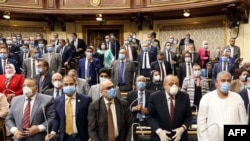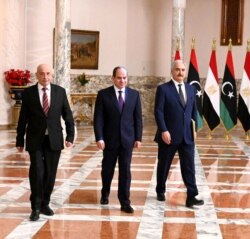The Egyptian parliament has authorized President Abdel Fattah el-Sissi to deploy Egyptian troops to neighboring Libya, should the need arise. Sissi warned the Tripoli-based Government of National Accord (GNA) and its backers in Turkey earlier this month not to cross a "red line" Egypt considers vital to its security in the Libyan coastal port town of Sirte.
The vote in Egypt's parliament for Sissi to intervene in Libya did not appear to set off any immediate military activity by rival forces in Libya.
Meanwhile, Egyptian media reported that Sissi spoke with U.S. President Donald Trump in a phone call Monday night, which focused on the need for a cease-fire in Libya to prevent further escalation of the ongoing conflict.
In a statement following its Monday vote, the Egyptian parliament said it "unanimously approved deploying members of the Egyptian armed forces on combat missions outside the country's borders to protect Egyptian national security." Parliament must approve any decision for Egypt to go to war by a two-thirds vote.
Libya's eastern-based parliament issued a statement a week ago authorizing Egypt—which supports the interim government of Abdallah al Thini in eastern Libya—to intervene militarily "if necessary," due to what it called "Turkey's blatant intervention in Libya and breaching of the country's sovereignty."
Egypt's Foreign Minister Sameh Shoukri said over the weekend that Cairo is watching the situation in Libya "closely." He said Egypt will take decisive measures to protect "Arab national security."
Egyptian lawmaker Emad Gad told Arab media that parliament's vote to give Sissi a green light to intervene in Libya "does not mean a declaration of war and that parliament did not specify when or how the president might intervene."
Libyan analyst Aya Burweila, visiting lecturer at the Hellenic National Defense College, told VOA that Egypt also is counting on Libyan tribal forces from all parts of the country to play a role in resolving the ongoing conflict. Egypt, she said, "understands that Libya's political and social life is organized around tribes” whose will and interests should not be circumvented.
Meanwhile, the French aircraft carrier Charles de Gaulle recently was deployed off Sirte to monitor any possible advance by Turkish-backed militia forces, according to Arab media. Paris supports eastern-based military commander Gen. Khalifa Haftar.
In other diplomatic activity, Algerian President Abdelmadjid Tebboune told Algerian TV that his country supports a political solution to the Libya conflict.
He said he's been in daily contact with the main players in the Libya crisis, including Russian President Vladimir Putin, French President Emmanuel Macron, Tunisian President Qais Said, and with Turkish officials by way of Gulf intermediaries. Tebboune added that he thinks the conflict must in the end be solved through negotiations."
The Tripoli government's interior minister, Fathi Bashaga, visited the Turkish capital Ankara Monday to discuss the Libyan situation with the Turkey's and Malta's defense ministers.
Libyan Army spokesman Col. Khaled Mohieddine told Arab media that Turkey has sent "thousands of militia fighters and mercenaries to fight his forces, including mercenaries from Syria and Tunisia."






